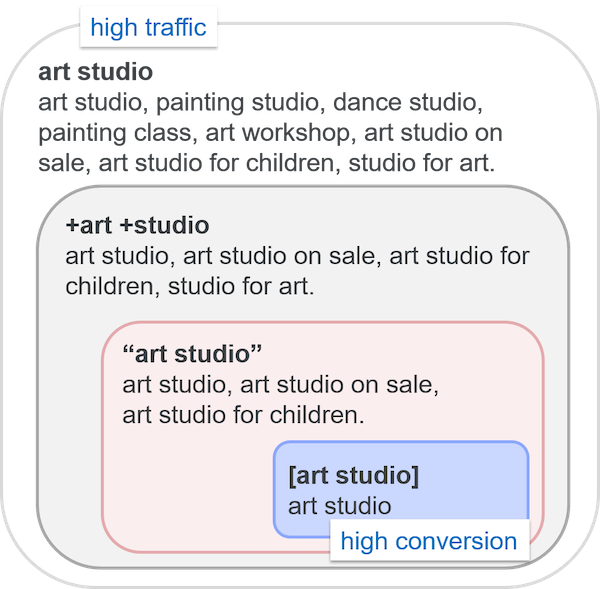What is keyword matching?
Keyword matching is the accuracy of a search result or search suggestion that a search engine generates to match a user’s search query.
It must closely match the user’s search query according to the keyword match type. Additionally, you can use this to filter out words that seem similar but have nothing to do with your products.
These are the four categories of keyword matches. You can read a more thorough description of each of these below.
- Broad Match
- Phrase Match
- Exact Match
- Negative Match
Broad Match
This type of keyword match shows your ads for every keyword in your query, as the name suggests. This setting is the default if you don’t set any keyword match types.
You don’t want the broad match to activate ads if any search query matches any of the terms in your long phrase.
This type of match may also take into account the following things to make good matches:
- Recent search actions of the user
- The information on the landing page
- Other keywords in an ad group to better understand keyword intent
Let’s take an example for the keyword: “denim jeans“
- denim jeans for woman
- how to choose denim jeans
- how to keep denim quality for jeans
Phrase Match
On searches for the meaning of your keyword, advertisements could appear. Compared to Broad Match, it is more focused. Compared to Exact Match and Broad Match, this enables you to reach more searches.
Put quotes around your terms, like “Water bottle,” to use phrase match.
Example for “mcdonalds”
- Mcdonalds burger
- Mcdonalds near me
- Mcdonalds in Delhi
Exact Match
You can utilize an exact match when you want to display advertising on searches with the same meaning or intent as the keyword. Compared to Broad Match and Phrase Match, this offers the most control over what to include in your search results and returns the fewest search suggestions.
Even if every keyword in a search query is included but listed in a different order, the search suggestions won’t be displayed.
Negative Match
You can use negative keywords to prevent your advertising from appearing when people search for those terms. You can enter the words or phrases that you don’t want to see your adverts for.
You may include a negative keyword for “blackboard” if you sell “whiteboards,” for instance.
Depending on your needs, you can also employ other capabilities like a broad negative match, negative phrase match, and exact negative match.
What makes keyword matching important to your Shopify site search?
Keyword matching is important for site search experience on e-commerce sites because it ensures that the search results returned to your user are relevant to their query, leading to a better user experience and increased sales.
When site visitors search for a product, they typically enter keywords or phrases related to the product they seek. Suppose your site’s search engine can match these keywords with the relevant products in site-wide catalogs.
In that case, it can quickly return accurate and relevant search results to the searcher. Therefore, this smooth site search experience can also increase your visitors’ likelihood of purchasing.
Implementing robust keyword-matching algorithms is essential for e-commerce sites to provide a positive user experience and increase sales.
Keyword matching in search engines



Types of keyword matching progressively filter the matched searches.
Google also allows negative keywords, which stop a certain word or phrase from activating the ad. Only those looking for that keyword will see an advertisement.
If the brand manager does not want the ad to display for searches of “Dove shampoo,” for instance, an advertisement for Dove body wash may use the suffix “-shampoo”.
















